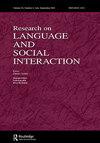How a Terminal Tag Can Display Epistemic Stance and Constrain Responses: The Case of Oder Nicht in German
IF 2.1
1区 文学
Q1 COMMUNICATION
引用次数: 3
Abstract
ABSTRACT This conversation analytic study explores German turn-final oder nich(t), as in Soll ich jetzt weiterlesen oder nicht (“should I continue reading or not”). These oder nicht-appended questions raise one state of affairs and invoke its negated version via oder nicht. They emerge in environments in which epistemics and/or deontics are negotiated. Through these turns, participants index their commitment to the likelihood of the state of affairs expressed in the question. Oder nicht works as an epistemic stance marker and minimizes the potential for disconfirmation. As such, oder nicht is a resource for questioners to design their questions in ways that index their stance that an agreeing response is more likely. Thus, oder nicht effectively constrains the recipient’s options (similar to English polarized tag questions). Data are in German with English translations.终结标签如何显示认知立场和约束反应——以德语“奥德夜”为例
摘要本会话分析研究探讨了德语中“Soll ich jetzt weiterlesen oder night”(我是否应该继续阅读)中的turn-final oder nich(t)。这些序夜附加的问题提出了一种状态,并通过序夜调用其否定版本。它们出现在认识论和/或道义论协商的环境中。通过这些转变,参与者将他们的承诺与问题中所表达的事态的可能性联系起来。夜间作为认知立场标记,并尽量减少潜在的不确认。因此,对于提问者来说,ordernight是一个资源,可以让他们按照自己的立场来设计问题,从而更有可能得到同意的回答。因此,顺序夜有效地限制了收件人的选择(类似于英语的极化标签疑问句)。数据为德文,并附有英文翻译。
本文章由计算机程序翻译,如有差异,请以英文原文为准。
求助全文
约1分钟内获得全文
求助全文
来源期刊
CiteScore
7.30
自引率
7.40%
发文量
20
期刊介绍:
The journal publishes the highest quality empirical and theoretical research bearing on language as it is used in interaction. Researchers in communication, discourse analysis, conversation analysis, linguistic anthropology and ethnography are likely to be the most active contributors, but we welcome submission of articles from the broad range of interaction researchers. Published papers will normally involve the close analysis of naturally-occurring interaction. The journal is also open to theoretical essays, and to quantitative studies where these are tied closely to the results of naturalistic observation.

 求助内容:
求助内容: 应助结果提醒方式:
应助结果提醒方式:


